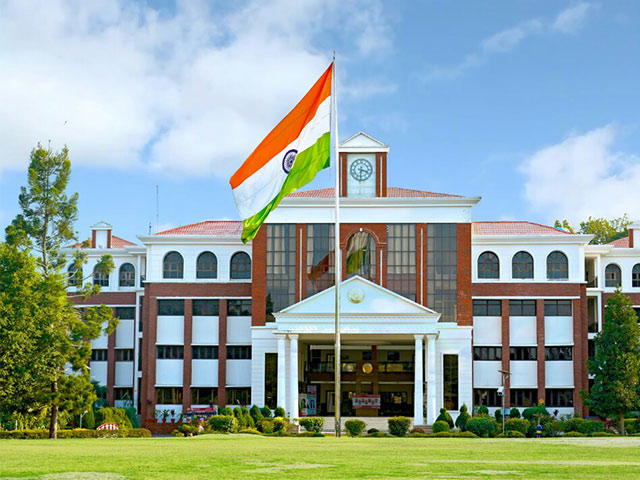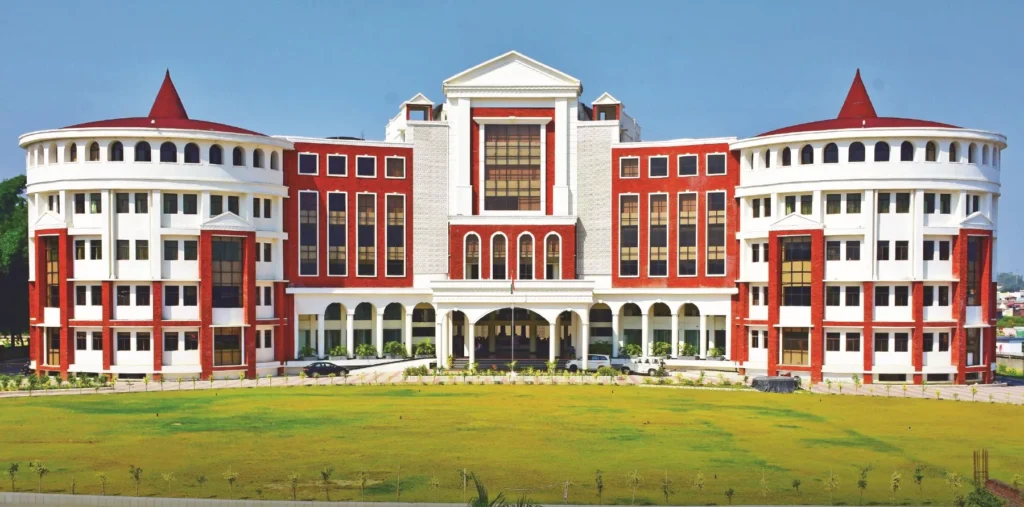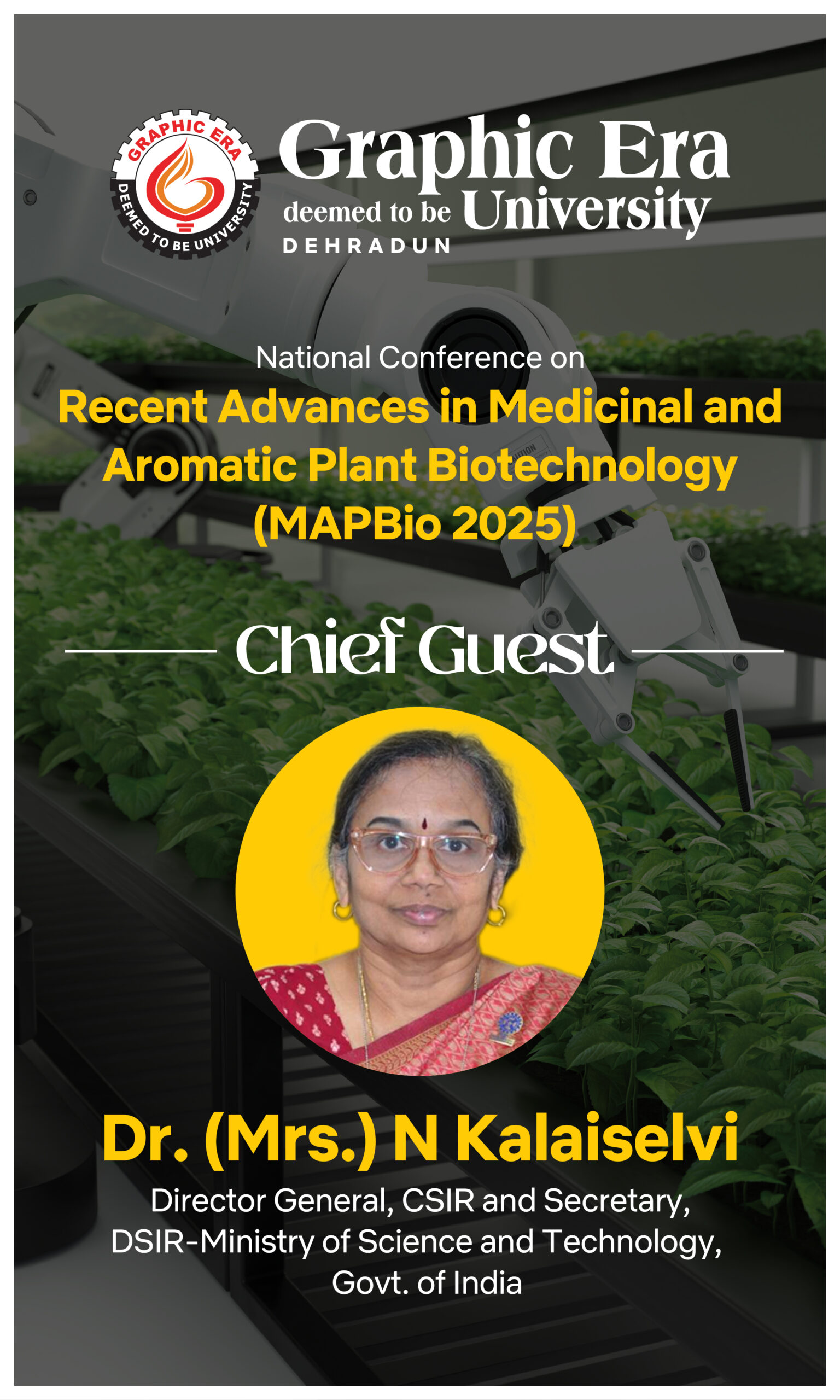
Graphic Era (Deemed to be University)
His vision gained concrete shape in 1996 the form of the Graphic Era Institute of Technology (GEIT). In 2008, it was accorded the status of Deemed University under Section 3 of the UGCAct, 1956 vide Notification F.9-48/2007-U.3 (A) dated 14 August 2008 and approved by the Ministry of Human Resource Development, Government of India.
Today, Graphic Era Deemed to be University stands tall as NAAC ‘A+’ accredited university with 7 NBA accredited programs and is ranked among the Top 100 Universities of India by National Institutional Ranking Framework (NIRF), Ministry of Education with All India Rank 52 in the Engineering Category, All India Rank 52 in Management Category, and All India Rank 48 in the University Category.
The premier university regards industry-academia partnership as an integral part of teaching methodology and curriculum and has taken big initiative in engineering programs by getting into partnerships with Tata Technologies and IBM. Moreover, it hosts Technology Business Incubator that funds, mentors and nurtures ideas, start-ups and technology-based entrepreneurship.
Graphic Era Deemed to be University has acquired transnational dimensions through student exchange and knowledge-sharing programs with many foreign universities and has been acclaimed and honored at international forums for its brilliance in upholding the highest standards of education. The alumni of Graphic Era are making their mark worldwide in marquee brands like Apple, Google, Microsoft, HSBC, to name a few and in the service of the nation in all wings of the Armed forces.
Graphic Era Hill University

Graphic Era Hill University, founded in 2011 by Prof. (Dr.) Kamal Ghanshala, aims to transform youth futures through quality education. Located in Dehradun, Uttarakhand, Graphic Era Hill University is a private institution established under Section 2(f) of the UGC Act, 1956, as part of the Graphic Era Educational Society.
Graphic Era Hill University is renowned for its innovative education system, producing professionals across industries. The picturesque Dehradun campus, bordered by Rajaji National Park and Clement Town Cantonment, offers a vibrant environment with state-of-the-art facilities, including sports amenities, modern accommodations, gyms, libraries, computer centers, high-speed Wi-Fi, smart classrooms, auditoriums, multiple cafeterias, and recreational areas.
Graphic Era Hill University also has campuses in Bhimtal and Haldwani. The Bhimtal campus, set in the scenic Kumaon region, offers a tranquil learning environment with modern facilities. The Haldwani campus combines modern infrastructure with the region’s cultural heritage, providing a rich educational experience.
Graphic Era Hill University offers undergraduate, postgraduate, and doctoral programs in engineering, law, management, computer applications, humanities, applied sciences, animation, fashion designing, journalism, mass communication, and agriculture. The university attracts a diverse student population from across India and abroad, enriching the cultural experience on campus. Graphic Era Hill University is committed to accessible
education, offering a 25% domicile fee concession to Uttarakhand students and additional discounts to deserving candidates. The university emphasizes holistic development through co-curricular and extracurricular activities, including sports, cultural events, and clubs, and encourages community service and social initiatives.
About the conference
The MAPBio-2025 Conference is the second consecutive event being organized in line with India’s vision for Viksit Bharat 2047 and the nation’s commitment to conserving biodiversity, advancing agricultural biotechnology, and promoting sustainable development. India, recognized as one of the world’s megadiverse countries, is home to an extraordinary wealth of medicinal and aromatic plants (MAPs), many of which hold immense potential for healthcare, nutraceuticals, pharmaceuticals, and livelihood generation. Harnessing this natural wealth requires a strong focus on conservation, biotechnological innovations, and translational research to ensure their sustainable utilization for present and future generations.
The Government of India has launched several initiatives to promote biodiversity conservation, sustainable agriculture, and innovation-driven biotechnology solutions, which are essential for achieving environmental sustainability, nutritional security, and economic empowerment of rural communities. The integration of plant tissue culture, genomic and transcriptomic technologies, and AI- and ML-driven tools is opening new opportunities for large-scale propagation, trait improvement, and climate resilience of MAPs. Cutting-edge approaches in stress biology, plant–microbe interactions, nanobiotechnology, and secondary metabolite engineering are further enabling researchers and industries to explore novel phytomedicines, nutraceuticals, and high-value bioactive compounds.
A strong emphasis is also being placed on linking science with sustainable livelihood and agriculture. This includes the development of eco-friendly cultivation practices, biotechnological interventions for conservation of rare and endangered plant species, and scaling up of innovative technologies for commercialization. Collectively, these efforts align with India’s goal of becoming a global leader in green and sustainable innovation.
With this background, the three-day National Conference on Recent Advances in Medicinal and Aromatic Plant Biotechnology (MAPBio-2025) aims to bring together scientists, academicians, researchers, entrepreneurs, industry representatives, and policymakers to deliberate on frontier research, emerging technologies, and strategies for conservation, sustainable utilization, and value addition of medicinal and aromatic plants. The conference will focus on the following themes:
- Plant Tissue Culture and Biodiversity Conservation
- Genomic and Transcriptomic Insights in MAPs
- Stress Biology and Climate Resilience
- Plant–Microbe Interaction
- Plant Metabolites, Nutraceuticals, and Phytomedicines
- Sustainable Agriculture
- Plant-Nanobiotechnology
- AI, Machine Learning, and Digital Tools in MAP Biotechnology
In addition to keynote lectures, technical sessions, and panel discussions, an exhibition will be organized to showcase innovations from research institutions, start-ups, and industries, fostering academia–industry collaborations and technology transfer. The conference aims to serve as a platform for networking, knowledge exchange, and project development, paving the way for advancing research and innovation in MAP biotechnology for a sustainable future.
Structure of the Conference
The three-day National Conference (MAPBio-2025) will commence with an inaugural session featuring eminent dignitaries and keynote speakers, setting the tone for discussions on advancements and opportunities in medicinal and aromatic plant biotechnology. This will be followed by a series of technical sessions, each beginning with a keynote address from a leading expert, highlighting breakthroughs in research, emerging technologies, and translational opportunities. The sessions will include invited talks, oral and poster presentations, and will conclude with interactive panel discussions aimed at fostering collaborations, developing joint research initiatives, and identifying strategies for technology development and commercialization.
As part of the conference, a cultural visit to Rishikesh has been planned to witness the Ganga Aarti on the banks of the sacred river Ganga. The Ganga Aarti is a deeply spiritual and auspicious ceremony performed every evening at sunset, symbolizing gratitude to the holy river. Uttarakhand, often called Devbhoomi (Land of the Gods), holds this ritual in high reverence, as the Ganga is not only a river but a divine embodiment of faith, heritage, and culture. Experiencing this serene and devotional ritual offers participants a glimpse of India’s spiritual traditions, fostering peace, reflection, and a connection with the rich cultural fabric of the region.
About the Department of Biotechnology
The Department offers B.Tech Biotechnology program, which is designed to equip students with a strong foundation in biological sciences, along with an understanding of various engineering principles. Our department boasts of well-qualified and experienced faculty members, as well as visiting professors from national and international institutes, who provide students with holistic academic training and experiential learning.
In over one and a half decade of our existence, the department is proud of its teaching and learning process in terms of our alumni who are now established names in institutes of national and international repute and also in terms of research and development, where the department has left an indelible mark. In 2022, we received the prestigious NBA Accreditation that bears testimony to our high standards of academics. The Department has completed several government-sponsored research projects worth crores, and many others are ongoing. The Department faculty members, research scholars and students collectively publish high-quality Scopus/SCI-indexed research papers and book chapters every year. Our research strength is further exhibited by the fact that our faculty and students have published several patents, and some of them have been granted.
We have established several research collaborations with institutes of national and international repute, our students, research scholars, and faculty members are members of many reputed national and international bodies, and are proud recipients of several awards and recognitions. We believe that this recognition highlights the quality of our academic programs and our commitment to excellence.
At the Department of Biotechnology, we strive to create an environment that fosters innovation, critical thinking, and interdisciplinary learning.
Early bird registration
Deadline for abstract submission
Deadline for registration
Opening of the submission of full-length papers
Full-length paper submission deadline


